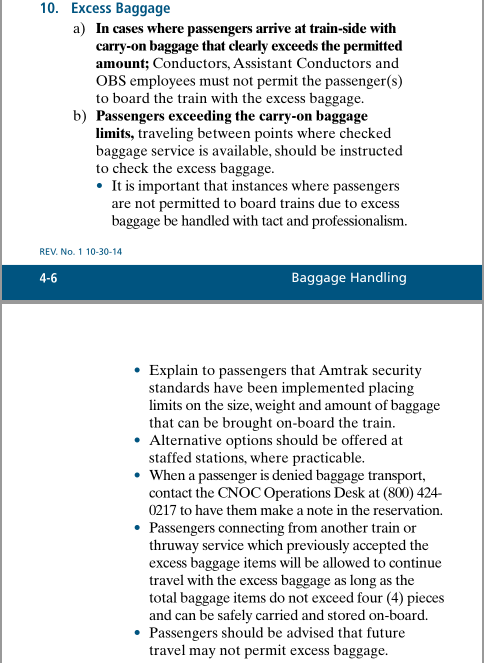True, though what if someone paid cash (i.e. the green stuff) for their ticket (or paid with a now-invalid credit card...for example, I've had to have my AGR card swapped three times over the years: Once for standard expiration, twice for fraud issues)? I really don't envy the conductor who gets into that position and then has to break a $100 bill because the traveler only has $15 in small bills for food.
What does how the original ticket was paid for have anything to do with how a surcharge is to be paid? I am afraid I am missing something. Yeah, paying by cash raise the usual paying by cash problems. That's life. Presumably there will be some policy to handle situations involving inability to pay.
Another thing to consider is that on the station side of things, you're going to have a lot of station agents who won't pursue this as not being worth the hassle and others who (as noted) decide to play the nitpick game because they can.
I can't even fathom how a station agent should go about handling this except in cases with observable huge piles of baggage. I would not expect them to do anything unless checking baggage is involved. If they have a personality disorder they will find some reason or the other to hassle passengers anyway. There is nothing stopping them now.
I'd also point out that with the airlines, there's at least a nominal justification for the charges insofar as weight on the plane is a significant restriction. On Amtrak? Space limits are a thing, yes, and reducing the limit a few years ago from three bags to two (checked and carry-on) likely had at least something to do with higher load factors (and borderline overloaded baggage cars...look inside the baggage car on a peak-season Silver Service train at SAV sometime and you'll see what I mean)...but it isn't like Amtrak
The amount of space on trains is not infinite either, so there is a similar justification except that the limits are higher as is the case already. One could quibble about what the limit should be, but there should be a limit and it should be enforced.
FWIW, the real danger is triggering a bunch of "never again" situations (either with a station agent being a pain or repeated on-board "surprises").
You can't satisfy everyone. For simply breathing air you would find a few "never agains". They are worthy of being let go. Why would anything on board be a surprise if they bother to understand the baggage rules? If they do not bother then that is life. We don;t have to suddenly become nanny outfit to babysit people through their life's problems.
In reality, what proportion of people do actually bring baggage even half way upto their full quota anyway? Are we mostly talking about theoretical problems?
























































